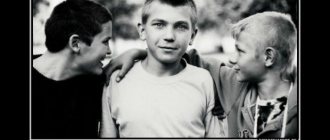Every day, continuous negativity of various sizes penetrates into our lives. The media helpfully report who killed, robbed, and ran over whom. Constantly various sources of information bring to our attention information about new disasters and political unrest. And the positive news, compared to the amount of negative news, is negligible. It seems that there is absolutely no kindness and goodness left in the world. Unfortunately, this stream has so “clogged” people’s heads that today no one even thinks about why people are so cruel? How can I change this? And is modern humanity really so soulless?
Are all people evil?
Everyone is familiar with cruelty. But this does not mean that every person is evil. Cruelty is a natural emotion that is aimed at self-preservation and defending one’s boundaries. Why it is absolutely normal for people to be angry sometimes is because anger is a kind of psychological barrier that protects a person.
It is important to be able to build this defense correctly. “The freedom of each ends where the freedom of another begins,” this quote belongs to the philosopher M.A. Bakunin, and it perfectly reflects how cruelty should be treated. It is permissible to defend your own freedoms in a critical situation in this way, but under no circumstances should you encroach on those of others.
Important! It is generally impossible to renounce cruelty, since this will result in a gradual suppression of the personality of the person who refuses.
Instability in society
An indirect cause of cruelty is growing anxiety. Social inequality and instability give rise to a feeling of discomfort. From TV screens, people again see cruelty. A person whose psyche is formed is able to distinguish the grain from the husk; he will not accept aggression as a call to action. A child will absorb on-screen scenes of violence like a sponge. And he can perceive all this as a kind of school of life. It is important to realize how much such television hurts the child’s psyche, and the answer to the question: “Why did people become cruel?” will be received instantly.
What is cruelty?
Cruelty is selfish selfishness, envy, hatred and malice towards other people, towards life and towards oneself. This is the result of a lack of success in achieving one’s own goals and objectives with intentional or accidental harm to everything around.
It's no secret: what goes around comes around - cruelty begets cruelty. Causing harm to everything around in order to gain benefit for themselves, people do not think about the consequences that will not take long to arrive.
Causes of stiffness
“We all come from childhood,” and so does cruelty. After all, no one is born evil, we learn this from others or become so by force.
In a normal situation, a small child can be cruel - tearing off the wings of a butterfly, pulling a cat by the tail, pinching mom and dad. But this comes from ignorance. The kid simply does not understand that others may be hurt by his actions.
Over time, he learns that this cannot be done, provided that he grows and develops in a favorable atmosphere. The child learns kindness, compassion, empathy (what is that?) and stops harming others.
In a situation where a little man grows up in a family where mom and dad fight and allow themselves the same behavior towards others, he will definitely absorb that cruelty is the norm. He will copy the behavior of significant adults and go with him into the big world.
And another reason why people become angry is humiliation, beating, insult, in a word - the suppression of a person’s self-esteem in childhood. A child who is treated this way cannot respond to adults in the same way, since he is too small and does not have the resources for this.
He endures. Outwardly, nothing seems to happen, but inside, anger is formed towards the whole world for one’s torment and suffering. Having matured, he will take revenge on the whole world.
There are several motives for a cruel person:
- dissatisfaction with myself, low self-esteem (having humiliated another, I become better and taller against his background);
- gaps in education - lack of ethical, moral values;
- exaggerated instinct for self-preservation (I have to be tough to survive);
- concealing one's inner weakness (demonstration of cruelty as proof of strength).
First argument
A. S. Pushkin’s novel “Dubrovsky” shows how one cruel act gives rise to others. Troekurov's actions lead to Andrei Gavrilovich Dubrovsky losing his estate and soon dying. Andrei Gavrilovich's son Vladimir cannot ignore Troekurov's actions, he decides to take revenge on him. Vladimir Dubrovsky is hatching a plan for revenge, while being the leader of a gang of robbers who act cruelly towards rich and noble nobles. Dubrovsky wants to punish these soulless and cruel people towards the peasants, but he himself commits cruel acts. A. S. Pushkin shows that the cruelty of some people is provoked by the cruelty of other people.
Egyptian plagues
There is a place in the Bible that can be considered as a kind of universal key to understanding human hardness in all its diverse manifestations. This is the story of Pharaoh, to whom God sends the prophet Moses to rescue the Jewish people from slavery, and at the same time speaks strange words to him: ... when you go and return to Egypt, see that all the miracles that I have entrusted to you, do before the face of Pharaoh, and I I will harden his heart, and he will not let the people go (Exodus 4:21 ). Then a whole series of disasters hit Egypt, known as the “plagues of Egypt.” As a result, the frightened Pharaoh first lets the Jews go home, having paid them very rich compensation for their years of slavery. But then he changes his mind, goes in pursuit of them, and as a result, dies at sea. You can read more about this whole story in the biblical book of Exodus. - A.T. with all his army.
There is a blatant injustice in the above words of God. Still: You yourself hardened Pharaoh’s heart, and then began to punish him, and, in the end, destroyed him? It is not surprising that this very passage in the Bible turned out to be the touchstone on which first the Soviets, and then today’s propagandists of atheism, honed their wits. However, hasty conclusions have always been evidence of a not very deep mind. And since we are talking about a replica from the Bible, there is probably a direct reason to familiarize yourself with the interpretation that the Church gives to it.
Illustration for the fairy tale “The Snow Queen”, Kai Nielsen
Main types
We have already found out what cruelty is and why it occurs. Now let's highlight the main forms that it acquires in the process of contact of an evil person with the outside world:
Read also: Eat dry food or eat soups
- Physical. Such cruelty is violence, the use of physical force, and the infliction of bodily injury and mutilation.
- Indirect. It looks like evil jokes, gossip, curses that significantly spoil the life of another person, bring him pain and trouble.
- Irritability. A state of being “on the brink”, when negative feelings are ready to manifest themselves at the slightest remark of the interlocutor, gesture, or glance.
- Negativism. Cruelty “out of spite.” It manifests itself in the form of senseless aggressive actions aimed at crushing established canons and traditions.
Cruel treatment of people also manifests itself in the form of threats, curses, swearing, and name-calling. In this case, the anger is verbal. It is essentially similar to the indirect one, only unlike it it has an open form.
Feelings of rejection
It is especially developed in adolescence. However, many adults carry these feelings into adulthood. Quite often you can observe a picture when a child exclaims loudly on the street and points his finger at a person with a different skin color or who has a physical disability.
Adults react completely differently. On a subconscious level, they experience a sense of danger. Immediately there is a desire to withdraw. But for some it manifests itself in cruelty and violence. It is this feeling that sometimes makes teenagers bully peers who are different from them. Why are people so cruel? Again, the instilled skills of tolerance and respect in the family will not allow a teenager or adult to behave this way.
Poor self awareness
People with poor self-awareness may not always notice the changes sent by those around them. For example, if something they say upsets you, they may simply not notice. These people are not trying to look disrespectful, they simply do not know how to behave in such a situation. They need to explain everything in detail (say what exactly upsets and offends you in this conversation), since not everyone will be able to read your thoughts. If you do this once (and even more so several times), without getting offended or reacting with aggression, then the person will definitely behave differently (at least with you). Try it, you will definitely succeed.
The country is experiencing a moral impasse
Name three words that most fully and accurately, in your opinion, characterize the current moral climate in our country.
Sergey Enikolopov:
Perhaps we can get by with two: moral impassability. That was the name of a book once published in the West. It characterized the situation that developed in Europe at the turn of the 70-80s, when the old morality collapsed, and a new one had not yet been born, and people were left without a rut. Russia is experiencing something similar now. One ideology is gone, but we don’t have another. And people enter the arena with an existential vacuum in their heads, as a result of which they become easily manipulated. I saw several people who were traveling to ISIS (an organization banned in Russia). But there was a feeling that if another manipulator had taken charge of them, they would have gone to the starving children of Africa or somewhere else.
The most paradoxical thing is that everyone hates everyone. Each social stratum has its own objects of hatred
But this is more of an ideological impasse than a moral one.
Sergey Enikolopov:
One is interconnected with the other. Now it is difficult to say with certainty what is good and what is bad. The boundaries are blurred. There are no moral taboos. Everything is permissible, everything is permissible.
Unbearable cruelty: why do people become brutal?
Human cruelty is growing, and ordinary domestic quarrels are increasingly ending in crimes.
Why does this happen and how can you fight it? The head of the medical psychology department of the Scientific Center for Mental Health of the Russian Academy of Medical Sciences, Sergei Enikolopov, spoke about this in the studio of the Morning of Russia program.
According to Sergei Enikolopov, it is wrong to say that all cruel people suffer from mental disorders. According to statistics, among those who have committed violent crimes, there are not many mentally ill people: 3-4%. More often, an attack of cruelty is the result of an accumulation of troubles (often small) troubles and a subsequent breakdown. The stress of a big city is generally a serious problem of our time. A person is influenced by many factors that are unnoticeable at first glance - the road to work in the dark, pressure on public transport and traffic jams, the constant feeling of an impending deadline. All of this can be experienced individually, but overall the tension still accumulates.
Another factor influencing the “epidemic” of cruelty is the availability of means that allow aggression to be more clearly demonstrated.
For example, the sensational story when a dispute about Kant’s philosophy ended in a shooting, both curious and terrible, simply could not have happened if one of the opponents did not have a pistol. There would also be fewer traffic conflicts that end in hospital or even death if about 20% of drivers did not carry a baseball bat with them “just in case.” A person who has access to a weapon behaves more aggressively than someone who simply has accumulated nervous tension.
Virtual communication also contributes to the development of cruelty. The younger generation is especially at risk here. People who are accustomed to communicating on the Internet have a worse understanding of the mood and intentions of the interlocutor and cannot always, firstly, understand that he is dangerous, and secondly, respond correctly to his actions.
To combat aggression in oneself, according to Sergei Enikolopov, two things help: self-control and a sense of humor. “Unfortunately, there are no other recipes,” says the expert.
Everybody hates everybody
The teacher hit the student, the student hit the teacher... One driver did not give way to another - he got out and took a bat from the trunk... The daily news feed is full of such stories. Anger, aggression, intolerance. How do you explain this from a psychological point of view?
Sergey Enikolopov:
Unfortunately, aggression is one of the best forms of protecting one’s “I” on a personal level. At certain moments, a person experiences certain threats, anxieties and fears because he is losing something: identification, work, place in the hierarchy, fame, etc. And then an explosion of aggressive behavior is possible. Take teachers, for example. They lost their Soviet status. Then the teacher was surrounded by an aura of respect and veneration, perceived as a sower of the rational, the good, the eternal. Who is he today? School has ceased to be a sacred place. A teacher can be humiliated and insulted. You can even hit him. The same applies to students. When I was studying, relationships could be sorted out either in the toilet or behind the school. You couldn't fight in class. If someone punched someone in the face in class, it was an emergency. Now you can do whatever you want at school.
Does aggression also stem from the fact that society is split along many lines? The poor hate the rich, losers hate successful people, locals hate those who have come in large numbers.
Sergey Enikolopov:
The most paradoxical thing is that everyone hates everyone. Each social stratum has its own objects of hatred. That is, it cannot be said that the poor hate the rich or vice versa. There are a lot of shades here. The completely rich, for example, hate the moderately rich, and together they hate the infinitely rich. Everyone has someone to hate.
It's easy to call such hatred irrational, but it probably has reasons. Which ones do you think?
Sergey Enikolopov:
In psychology there is a concept “I-concept”. This is a stable system of an individual’s generalized idea of himself. For example, the following “I-concept” is possible: “I am good. The world is fair." To support this concept, a person will give you many examples, although he knows very well that the world is unfair. But internally he has the conviction that the world is just, that it cannot but be fair. And when this belief collapses, the person receives severe psychological trauma. Why are previously unimaginable attacks on teachers and doctors now happening? Because this is the social status of these professions. Today, a school or a medical institution is a constant feeling that you are nobody, that you are despised and therefore you can be treated as you please.
Aggression is also generated by television talk shows, whose participants, from morning to evening, without mincing their words, wash their own and other people’s dirty linen. In the public space, things have become possible that previously, even in a close family circle, were often considered beyond the bounds of decency. Maybe our society is becoming more open and we should be happy about it?
Sergey Enikolopov:
Man is designed in such a way that he learns most effectively by observation. Seeing how close relatives squabble in public, the observer begins to feel anxious. How so? Am I really raising a little wolf cub now? As a result, everyone begins to doubt everyone. And these doubts, this uncertainty about human integrity, sooner or later result in aggression. It is no coincidence that when analyzing suicides in the West, the term “contagion” is used. If the media reports someone's suicide, wait for the next one. And celebrities make the greatest contribution to the suicide epidemic. Statistics showed that after the death of Marilyn Monroe, the number of suicides increased by 12 percent within a month. It's an infection. Infection.
Perhaps violence is just as contagious?
Sergey Enikolopov:
It's the same with violence. Having seen what some so-called law enforcement officers sometimes do, you are imbued with the conviction that if something happens, it is useless to contact the police. It is this anxiety, the perception of the world as hostile that forces a person to be on the alert all the time, setting him up to instantly rebuff anyone who, as it seems to him, is encroaching on his freedom, sovereignty, or even everyday comfort.
This is probably why today it is easy to predict the emotional reaction of the “average” Russian citizen to a request to turn down the music or stop swearing in a subway car. I must admit, I am afraid to make such requests.
Sergey Enikolopov:
Me too. Spend a day watching TV series about bandits, and you will get the feeling that you can’t trust anyone, there are lies, deceit, betrayals, and “set-ups” everywhere. And that there is no pain for the beaten person. An addiction to violence occurs.
Anger is a destructive trait
A trait such as anger is the personification of several qualities at once:
- irritability;
- dissatisfaction;
- contradiction in worldview and oneself;
- selfishness.
Is a physical state characterized by an emotional structure in the brain. This is a reaction to a situation that prevents the satisfaction of a need. The manifestation of anger is often associated with psychological trauma. It all depends on the situation; sometimes the worst trait hinders the personality or, on the contrary, mobilizes opportunities. Often an angry person crosses boundaries, allowing himself to throw out negativity.
Anger is one of the worst qualities
The main problem is that anger tends to accumulate. Upon reaching a large volume, it turns into such a quality as aggression, which often spills out with destructive consequences. Hatred should not be confused with anger; these are different traits, but they have common causes of origin. It is possible, even necessary, to get rid of anger, especially when there are fewer and fewer people around who want to communicate
It is important to find the reason for the manifestation of this trait and work on yourself
How to overcome cruelty?
Knowing and understanding what cruelty is, you can take certain measures to protect yourself from it. Among them are simple methods and work on yourself:
- If you realize that cruelty is evil, then this is the first step towards solving the issue of getting rid of it.
- It is necessary to love yourself, people and the whole world around you, thereby getting rid of internal fears.
- You need to give to the world what you yourself want to receive: mercy, compassion, kindness.
- Increasing self-esteem, the desire for success, and social recognition is one of the effective ways to combat cruelty.
- Limiting your social circle. Surrounded by kind and decent people, the world becomes cleaner.
Thus, cruelty is caused by both external and internal factors that are ingrained in a person from childhood. We talked not only about our own ability to be cruel, but also about the very attitude of other people to such manifestations. Therefore, it is necessary to fight and prevent this character trait from childhood, instilling in the child kindness and mercy towards the people around him.
Feeling angry
familiar to every person.
This condition can be explained not only from a psychological, but also from a medical point of view.
Negative stereotypes
How many times have they told the world that by radiating negativity, you will attract even more similar situations that cause negative emotions. What does it take to be successful? Faith that everything will come true. If you want to taste success, feel like a successful and prosperous person. Give yourself a deep breath. Remove the shackles of unnecessary statements that have accumulated in your head for many years. Let them go and start living differently. Think more about your dreams, make plans, even the most incredible ones, build your life the way you dream about. Help each other push off from the dead point and start moving. We need to learn to give more. Everything will definitely come back. Of course, at first you will have to make an effort and show willpower, to prove to yourself that all the steps are not in vain. Write what you want your life to look like in a few years. Just do it without limiting stereotypes. Don't believe the words, better try it.
Human society has been constantly and intensively developing for many centuries. One era gives way to another, progress in all spheres of activity has raised man to the pedestal of the dominant species on planet Earth.
One thing is bad: everything changes on the path of progress, but no one, with all their aspirations, strengths and capabilities, could either ban, overcome or abolish cruelty. This character trait, like many others, manifests itself in different situations, changing a person to unpredictable consequences.
Root of Evil
The feeling of anger is given by nature. It is necessary in order to mobilize all forces for the fight in dangerous moments. But how it will be used by a person depends on the moral standards instilled in childhood. If parents show aggression towards their child, it will definitely come back to haunt them. Relationships between children and fathers based on fear are likely to be adopted by the adolescent in his interactions with peers. It is in the family that one should look for the root of evil. This kind of upbringing clearly explains why people become cruel.
Although in this situation the child may develop another model of behavior: he decides that he is bad and is to blame for everything. Such a teenager becomes a victim of cruel treatment by peers. Often he does not even look for methods of protection, believing that he deserves this.
Sometimes the cause of aggression may not be violence at all, but overprotection. This method of education puts a feeling of permissiveness into the child’s subconscious. The teenager considers himself the most important and demands unquestioning obedience. Unfortunately, a person who was not taught by his parents to respect others will not gain this wisdom anywhere else. He won't even notice how he humiliates you.
Relationships with family
All people tend to be cruel. For some this happens very rarely. Others show aggression quite often. At the same time, anyone can commit a cruel act, and quite often such outbursts occur in truly kind people. Unfortunately, all the negativity spills out on those closest to us. For those who are truly loved and very dear. Why are people so cruel? What makes them “take out” their anger on their relatives, and restrain their outbursts of anger with those around them? Why can’t you control your behavior when communicating with loved ones?
Yes, because relatives are not going anywhere. When communicating with strangers, a person restrains himself. There are many reasons: the desire to win over the interlocutor, and the fear of losing an interesting friend. In the case of a boss, intemperance can lead to dismissal. But when you find yourself in a circle of relatives, especially in a bad mood, even one word can make a person angry. That’s when a scandal breaks out out of nowhere. Of course, this is fundamentally wrong, but the accumulated negativity requires discharge. That’s why it spills out on those closest to us. They, even if you greatly offend them and quarrel with them, love them so much that they will still forgive.
Child cruelty
The list of causes of cruelty in children will be slightly different than in adults. Often, they copy the behavior model of their parents, whose pattern is the absolute norm for them. The child absorbs the atmosphere of a family where they constantly quarrel, raise their voices at each other and raise their hands.
Families professing deep religious beliefs subject their children to cruel punishments for the sake of their “spiritual salvation”, often crippling their psyche. Such children will rarely be able to gain the ability to understand and forgive in the future.
Along with overprotection and total control, with an acute lack of care and attention, a child can also become rude and insensitive.
At the age of 9-11 years, teenagers striving for leadership sometimes try to attract attention to themselves in perverted ways, establishing themselves in images that carry fear and violence.
Where do these character traits come from?
No one really knows why some people are sadists. Some believe that sadism developed as a reaction to the need to kill animals during hunting. Others believe that he helps people achieve influence and break through to power. Neuroscience suggests that sadism could be a survival tactic during difficult times.
When certain foods are scarce, the level of the neurotransmitter serotonin, the “happiness hormone,” in our body drops. This makes us more likely to want to harm others because it becomes more enjoyable.
Psychopathy can also be opportunism. A number of studies have linked higher levels of psychopathy to greater fertility (although the opposite has also been found). The reason for this may be that psychopaths have a reproductive advantage in aggressive environments.
Indeed, psychopathy flourishes in the unstable world of fierce competition. The abilities of psychopaths make them skilled manipulators. Their impulsiveness and lack of fear help them take risks and achieve short-term goals.
The fact that psychopathy is alive and well in the modern world can also be explained by its connection with creativity. Eric Weinstein, a mathematician and economist who applies the theoretical achievements of mathematical physics to traditional economics, argues that in general, people with strong character are the engine of progress.
However, when the environment is conducive to creative thinking, the advantages of psychopaths are no longer so obvious.
Sadism and psychopathy are usually closely related to other character traits - narcissism and Machiavellianism. These aspects of human personality have a common denominator - the so-called D-factor, the "dark triad" factor.
The hereditary component to these traits can be either mild or strong. Some people may be born this way. Or parents who have high D-factor levels may pass on these personality traits to their children by behaving harshly within the family.
It is clear that observing how others behave can teach us to behave the same way. So each of us has a role to play in the fight against cruelty.
Other methods of protection
Anyone who has suffered from cruelty needs to take immediate action. First, enroll in a martial arts school. Having studied self-defense techniques, the victim will be able to apply them in practice - on his offender. Some experts argue that it is not worth responding with anger to aggression. But some psychologists are still confident that a change in behavior puts a cruel person into a stupor. He does not expect such pressure and retreats.
Secondly, you need to ask for help. If aggressive behavior comes from children, then talk to their parents and teachers. When an adult shows cruelty, law enforcement agencies will provide significant support: they will not only protect you from the offender, but will also determine his punishment if his actions are particularly violent. In the case of verbal cruelty, you can simply ignore unpleasant words or respond to them with humor - the opponent will soon get tired of wasting his energy and will find another object to claim.
What is cruelty? This is a phenomenon that can be completely eradicated. The most important weapons in the fight against aggression directed towards you are your firmness, confidence, equanimity, competent actions and the ability to stand up for yourself.











